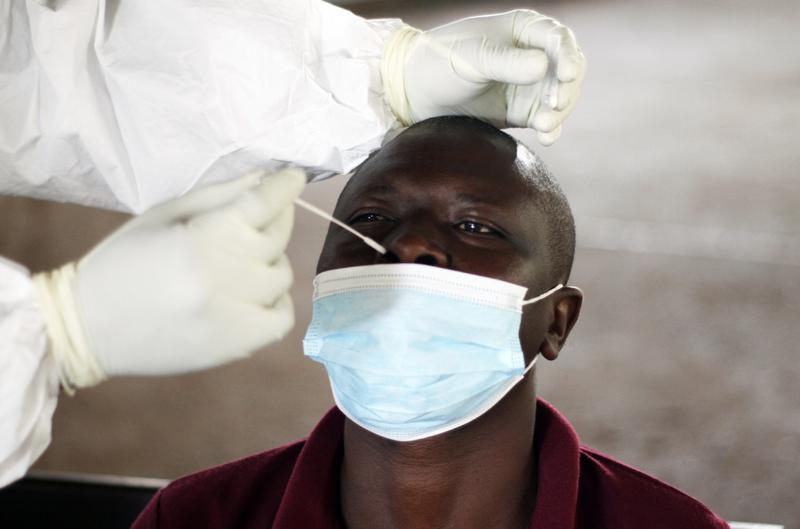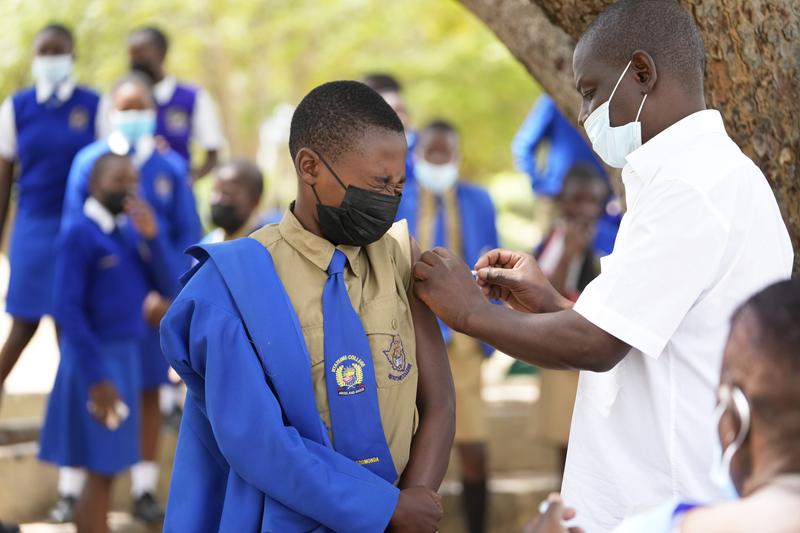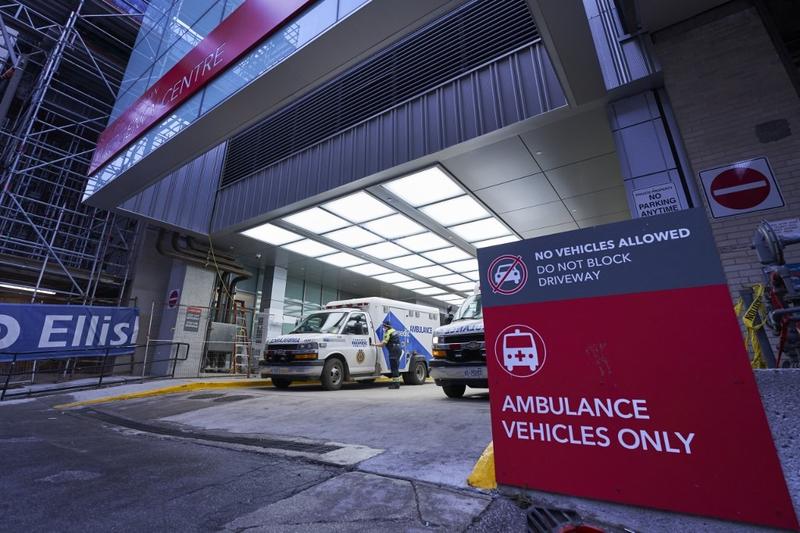 A man is tested for COVID-19 at a private health center in Harare, Zimbabwe, Feb 3, 2022. (TSVANGIRAYI MUKWAZHI / AP)
A man is tested for COVID-19 at a private health center in Harare, Zimbabwe, Feb 3, 2022. (TSVANGIRAYI MUKWAZHI / AP)
HARARE / MOSCOW / OTTAWA - Zimbabwe's COVID-19 response chief coordinator, Agnes Mahomva, has warned that the country is not yet out of danger of a resurgence of the pandemic, amid concerns that people are getting more complacent following a general decline in the number of infections and deaths.
National COVID-19 regulations still stipulate that only those who are fully vaccinated are no longer required to wear face masks in public open places, although they are still required to do so in enclosures and while using public transport.
However, many retailers are now allowing people to enter their shops without masks, while public bars are filled up with both vaccinated and unvaccinated people.
Mahomva told Xinhua in an interview that people were now suffering from fatigue, but they should realize that they were still in danger of getting infected.
READ MORE: US: New COVID variant cases surge as vaccination rate lags
"So people are just being relaxed, fatigued - the usual complacency when things seem to be going well."
A branch manager with one leading retail chain in Zimbabwe said it was now difficult to force customers to wear face masks.
"We realized that our rivals were allowing people without masks to enter their shop, so we ended up losing our customers to them. As a result, we now look the other way when people without masks enter our shops, otherwise, we will lose them all to the rival," he said.
Mahomva said her task force continued to encourage people to mask up to minimize infections.
"We continue to also work with the law-and-order sub-committee of our task force which is mandated to follow up and chase up those who break the law," she added.
The fatigue seems to also have caught up with members of the police force, some of whom move about in crowded places without wearing face masks.
"All I can tell you is that there is some complacency out there. There's quite a lot of COVID-19 fatigue here in Zimbabwe and globally, but it doesn't mean we're out of danger. We continue to say we have to remain vigilant," Mahomva said.
The government this week expressed concern that there was a notable increase in COVID-19 cases compared to the previous week.
Addressing a post-cabinet media briefing Tuesday, Acting Minister of Information, Publicity and Broadcasting Services Sekai Nzenza said Zimbabwe was witnessing an increase in COVID-19 new cases, which had risen to 295 last week from 179 recorded the previous week.
Hospital admissions had also increased to 26 last week from 13 reported the previous week, she said.
"The slight increase indicates that the country needs to remain vigilant," she said.
 A young boy reacts while being vaccinated at a school on the outskirts of the capital, Harare, Zimbabwe, March 24, 2022. (TSVANGIRAYI MUKWAZHI / AP)
A young boy reacts while being vaccinated at a school on the outskirts of the capital, Harare, Zimbabwe, March 24, 2022. (TSVANGIRAYI MUKWAZHI / AP)
"In view of the small increase in new cases, Cabinet has resolved that all provinces include the COVID-19 vaccination activities in the second round of poliomyelitis vaccination campaign scheduled for December 2022; and that provinces continue strengthening community engagement on all COVID-19 Public Health and Social Measures in order to address the 'COVID-19 fatigue' being observed in most communities," she said.
Zimbabwe conducted the first round of polio vaccination throughout the country from Oct 27 - 30 to protect children below the age of five years following an outbreak of the disease in neighboring Malawi and Mozambique. The second vaccination program will run on Dec 1-4.
Nzenza said as part of the COVID-19 response, provinces were continuing to prioritize COVID-19 vaccinations in all schools, with a focus on the 503 secondary schools which had not yet reached the second dose coverage target of 70 percent.
ALSO READ: Moderna's Omicron shots better against virus than original jab
According to the Ministry of Health and Child Care, Zimbabwe had recorded a cumulative total of 258,643 COVID-19 cases as of Nov. 13, with 252,567 recoveries and 5,610 deaths.
As of the same date, a total of 6,560,712 first doses of the COVID-19 vaccine had been administered, while 4,929,331 people had received their second dose and 1,215,375 their third dose.
Russia
Russia has registered 5,380 new COVID-19 cases in the past 24 hours, taking the nationwide tally to 21,514,341, said the official monitoring and response center on Wednesday.
The center said the nationwide death toll increased by 63 to 391,212, while the number of recoveries grew by 6,906 to 20,919,237.
Meanwhile, Moscow reported 1,041 new cases, taking its total to 3,243,204.
 A paramedic returns to their ambulance outside the emergency department at Mount Sinai Hospital in Toronto, Ontario, on Jan 5, 2022. (GEOFF ROBINS / AFP)
A paramedic returns to their ambulance outside the emergency department at Mount Sinai Hospital in Toronto, Ontario, on Jan 5, 2022. (GEOFF ROBINS / AFP)
Canada
Canadian parents are struggling to book doctors' appointments with long wait times of up to six months, with an increase in cases of respiratory syncytial virus (RSV) among children and cases of COVID-19 and the flu, CTV News has reported.
"(The secretary) basically said people are waiting three to six months for an appointment," a mother told CTV News in a telephone interview who tried booking an appointment at her son's clinic in August and was told the earliest appointment was in November.
ALSO READ: Spike in flu, RSV, COVID cases overwhelm US health facilities
Several parents wrote to CTV News about their difficulties with booking doctors' appointments for their children over the last few months. The emailed responses have not all been independently verified, according to the report.
An increase in RSV cases among children is leaving pediatric hospitals across Canada overwhelmed by the surge of new patients. In addition to RSV, cases of COVID-19 and the flu are also contributing to an increase in viral infections at hospitals, resulting in what experts are calling a "multi-demic," the report said.
According to the Canadian Pediatric Society, the ongoing shortage of children's pain and fever medications, such as Tylenol and Advil, also plays a role in the increased demand for appointments within Canada's health-care system, the report said.


